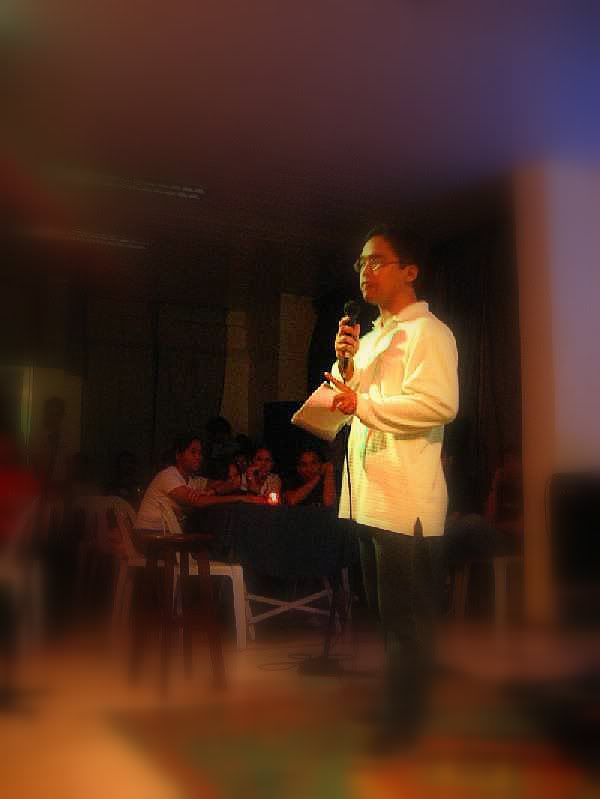
"Pah!" I said. My less-than-logical inclination to remain loyal to affiliations i've already made prompted me to have unfavorable notions about How I Met Your Mother even before I watched the show. A chance viewing of a single episode, however, quickly changed my mind.
 How I met your mother is a comedy set on the year 2030 where the main character, Ted, tells his kids a plethora of stories on how he and their mother met, and how they (presumably) ended up together. Their stories are told through a future-flashback (does that make sense?) manner.
How I met your mother is a comedy set on the year 2030 where the main character, Ted, tells his kids a plethora of stories on how he and their mother met, and how they (presumably) ended up together. Their stories are told through a future-flashback (does that make sense?) manner.The show is about Ted and his grandiose quest on meeting and marrying 'the one' for him. Twenty seven, a budding architect, living in New York City on 2005 and his friends getting engaged, Ted suddenly feels his clock is ticking, and he must do all that he can to finally meet the woman of his dreams.
Enter Robin. A starting reporter on a struggling station, Robin is a Canadian who recently moved to New York to reach for her dreams. Beautiful and friendless, Robin gets hit on by most men she meets, and Ted's bumbling and inoffensive ways become her breath of fresh air.
 Things aren't that easy, of course, as complications hindered Ted from being with Robin. The plot of the series is driven by this quest, while the comic relief comes mostly from Ted's lovable-asshole of a friend, Barney (click on the link to read Barney's blog).
Things aren't that easy, of course, as complications hindered Ted from being with Robin. The plot of the series is driven by this quest, while the comic relief comes mostly from Ted's lovable-asshole of a friend, Barney (click on the link to read Barney's blog).The series is funny enough to keep me and my friends awake till 3 am on a workday. The plot is engaging, and while the characters may still be uni-dimensional, Rome wasn't made in a day, after all, and I've only watched the 1st season. Having said that, I can't help but admit that there is something... tiresome about the program.
How I met your mother is about a guy's search for love. This doesn't sound bad at all if not for the fact that the show is all about this. Ted's character is a pitiable man. A man crippled, paralyzed, beaten, confused, and incomplete if he is not in love or if the woman he wants is not in love with him.
The show advocates the long-standing lie perpetuated by Hollywood - that romantic love is the be-all and end-all of our existence. Through Ted's relentless and consuming compulsion to find the woman he would want to marry, viewers are implicitly taught that there is no greater pursuit than the pursuit of love.
While it is true that being in love is a most wondrous human experience, it is not the apex of our lives. What is troubling here is that no matter how smart you are, being bombarded by this Hollywood-pimped value inadvertently affects what we expect out of our lives. You don't believe me? Just ask yourself this -- how many perfectly wonderful people you know (blessed, able, healthy) are wallowing in sadness just because they have no one with them? How many people do you know whose happiness is defined by being loved?
This trend would be less problematic if we have the right idea of love, but sadly, the majority of us have the notion that love is the all-conquering feeling we have on certain times of our lives.
This is why we hear of fathers leaving their families for another woman (who, incidentally, is 10 years younger and 25 pounds lighter than his wife) because "he can't fight what's inside him." This is why we hear of high school girls quitting school and disobeying their parents and getting impregnated in the process because she found a boy who "really understood" her. This is why we hear of ministers, of worship leaders, of people who profess to be of Christ in appalling scandals because "God will forgive" them, after all -- nothing's wrong with love, right?
"Bullshit." as the Real Live Preacher would say. Love is something that you do, not something that you feel.
All in all, I eagerly await the 2nd season of How I Met Your Mother. The series is funny, even though I find some values perpetuated by the show objectionable. I will continue to watch it because I have been made aware and now vigilant of the the messages that the program gives us. I wonder, however, about the young men and women who are still deciding on the things they will believe all their lives. If they get bombarded by messages like these everyday, how long will it take before they believe it?




